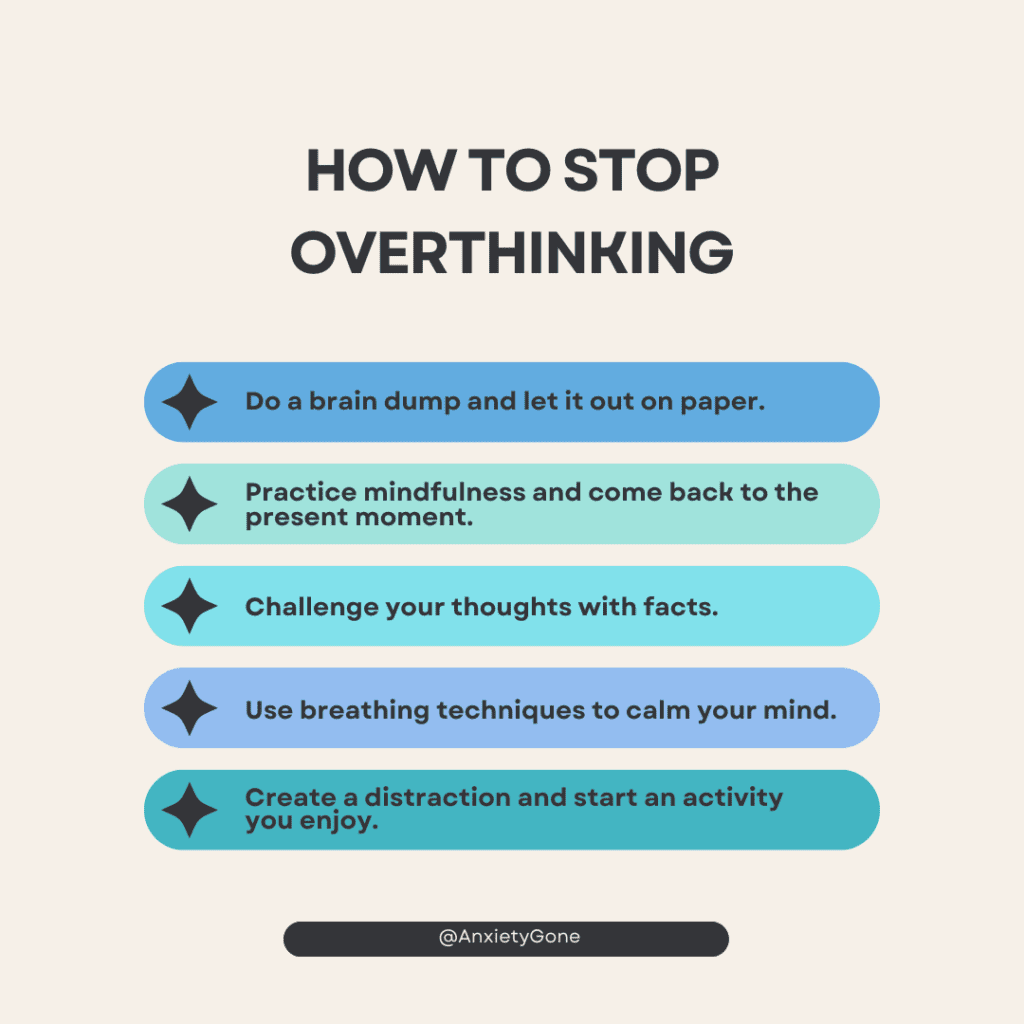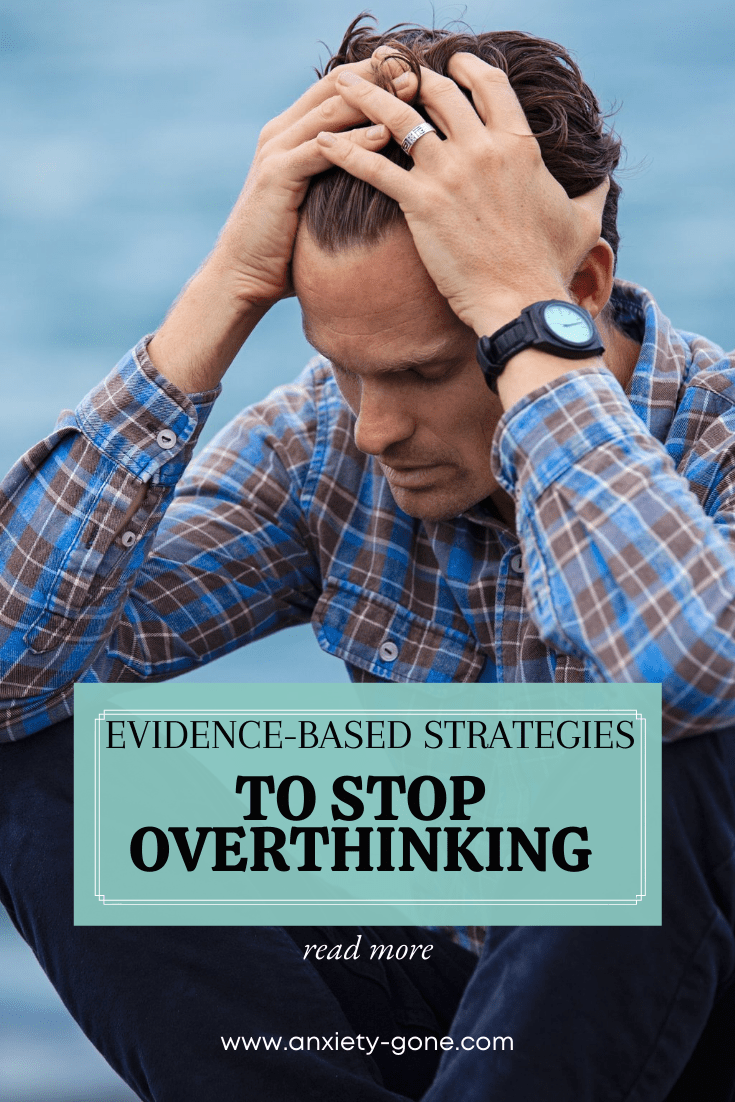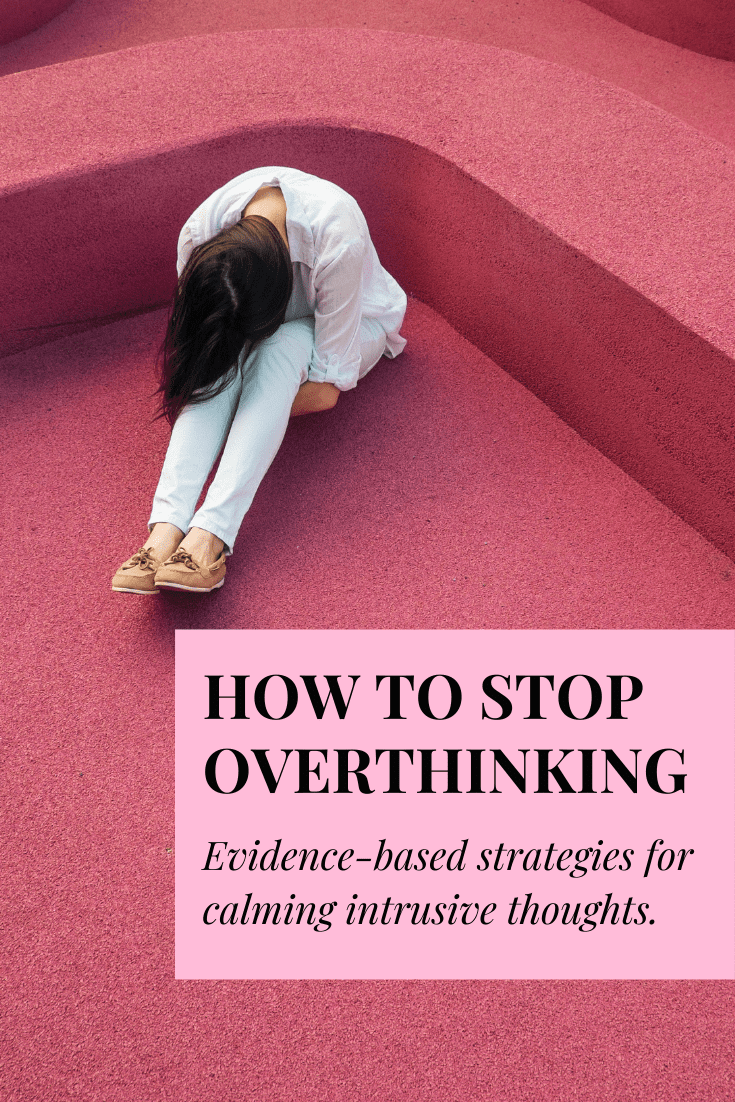Full Disclosure: Clicking on these links could mean a tiny commission for me, at no extra cost to you.
If you’ve been wondering how to stop overthinking, whether you’re experiencing intrusive thoughts or the never-ending anxiety cycle, you’ve come to the right place. Overthinking and worrying are common thought processes that everyone experiences, but it can quickly become too overbearing when the thoughts are constant and intrusive. Perhaps you go over what happened in the past or maybe you think about what may happen in the future to the point where it disrupts your present. Excessive overthinking and worrying are symptoms of mental health disorders such as depression and anxiety, and it may even increase your susceptibility to developing these disorders.
What is Overthinking?
While it is true that overthinking can be a symptom of a wide array of mental health disorders, overthinking is something everyone experiences.
Types of Destructive Thought Patterns
Overthinking can manifest in various forms, including:
- Ruminating: Dwelling on past events, mistakes, or perceived shortcomings, often leading to feelings of regret or guilt.
- Catastrophizing: Exaggerating the potential negative outcomes of a situation, imagining the worst-case scenarios, and feeling overwhelmed by fear or anxiety.
- Worrying: Constantly fretting about the future, anticipating problems, and feeling tense or apprehensive about what lies ahead.
- Analysis Paralysis: Overanalyzing decisions or choices, becoming indecisive due to excessive consideration of potential outcomes, and struggling to take action.
- Anticipatory Anxiety: Experiencing anxiety or stress in anticipation of future events or situations, even if they are not imminent or certain.
- Perfectionism: Setting excessively high standards for oneself, obsessing over minor details, and feeling dissatisfied with anything less than perfection.
Recognizing the different types of overthinking can help individuals identify their own patterns and develop strategies to manage them effectively.
Types of Cognitive Distortions
Cognitive distortions are patterns of thinking that are irrational or biased, and that often lead to inaccurate perceptions of reality. Here are some common types of cognitive distortions:
- All-or-Nothing Thinking (Black-and-White Thinking): Seeing situations as either all good or all bad, with no middle ground. For example, thinking, “If I’m not perfect, then I’m a failure.”
- Overgeneralization: Drawing broad conclusions based on limited evidence or single incidents. For instance, believing that one negative event means that similar situations will always turn out badly.
- Mental Filter: Focusing exclusively on negative aspects of a situation while ignoring or discounting positive aspects. This can lead to a distorted perception of reality, where only negative outcomes are recognized.
- Disqualifying the Positive: Rejecting positive experiences or feedback by minimizing their importance or attributing them to luck or coincidence. For example, dismissing a compliment by saying, “They’re just being nice.”
- Jumping to Conclusions: Making assumptions about the thoughts, intentions, or beliefs of others without evidence. This can include mind-reading (assuming you know what others are thinking) or fortune-telling (predicting negative outcomes without evidence).
- Magnification and Minimization: Exaggerating the importance of negative events or qualities (magnification) while downplaying or minimizing positive events or qualities (minimization). This can lead to an imbalanced view of reality.
- Catastrophizing (Magnification): Imagining the worst possible outcome of a situation and exaggerating its potential consequences. For example, believing that a minor mistake will result in complete disaster.
- Personalization: Taking responsibility for events or outcomes that are beyond your control, or attributing external events to yourself without evidence. This can lead to feelings of guilt or unwarranted self-blame.
- Should Statements: Setting rigid rules or expectations for yourself or others, and feeling distressed when these expectations are not met. For example, thinking, “I should always be perfect,” or “Others should always treat me fairly.”
- Emotional Reasoning: Believing that your feelings reflect objective reality, regardless of evidence to the contrary. For example, thinking, “I feel stupid, so I must be stupid.”
Recognizing and challenging cognitive distortions is an important step in cognitive-behavioral therapy (CBT) and other forms of psychotherapy. By identifying and correcting these distorted thoughts, individuals can develop more balanced and realistic ways of thinking.
Signs of Overthinking
Ever find yourself stuck on the same thoughts or fears, going around in circles in your head? Yep, we’ve all been there. Recognizing when this happens is the first step toward tackling it.
Here are some signs that you might be overthinking or ruminating:
- Thinking about the same worries or fears on repeat.
- Jumping to worst-case scenarios in your mind.
- Playing out something bad that happened in the past over and over again.
- Spending a ton of time dwelling on negative thoughts about what’s already happened or what might happen in the future.
- Feeling down or bummed out because of all those thoughts swirling around in your head.
- Getting so caught up in one thought that you can’t focus on anything else.
- Racking your brain over a problem even after you’ve already come up with some reasonable solutions.
- Finding it hard to move on to the next thing because you’re stuck ruminating on the same old problem.
Sound familiar? Don’t worry, you’re not alone. Recognizing these signs is the first step toward getting out of that overthinking cycle.
Exclusive Offer: Download our Overcoming Overthinking Workbook here.
How to Stop Overthinking
Whether it’s a full-blown habit or just a passing phase, ruminating and obsessing over things, especially those beyond your control, can leave you feeling like your mind’s taken over. But don’t sweat it—finding ways to cope and manage your tendency to overthink is key.
Sure, you can’t just snap your fingers and make the overthinking disappear (fun fact: trying to avoid those intrusive thoughts can actually make them pop up more often). But fear not! Here are some science-backed tips to help you dial down the overthinking and pave your way to a more positive outlook on life.
Relaxation Techniques for Overthinking
Relaxation techniques are activities that serve to alleviate tension and stress by reducing cortisol levels (your stress hormone). The most common relaxation techniques you’ve likely heard of (and maybe even have tried yourself) include Box Breathing, Guided Imagery, and Progressive Muscle Relaxation.
How to do box breathing?
How to use guided imagery?
Guided Imagery can help reduce negative thoughts by encouraging you to think about and visualize calming environments. The first step is to find a comfortable position and space, free of distractions. Next is to recall or imagine a calming experience such as going to the beach. Try eliciting these through the five senses – see the water, hear the waves, smell the sea salt, feel the sand, taste the beachy air. Finally, take slow, deep breaths and continue visualizing this calming experience.
How to use progressive muscle relaxation?
Progressive Muscle Relaxation serves to relax muscles by releasing tension from the body. The first step is to find a comfortable position and space, away from distractions. The next steps will be exercises done on different parts of the body – from head to toe or vice versa. For each step, aim to hold for five seconds and release for ten seconds, with a focus on trying to feel the relaxation that comes along with it.
The first step is to feel and flex or curl the toes for 5 seconds, and then release for 10. Then, head onto your legs, the muscles in the hips and buttocks, and the muscles in the stomach and chest. Next are the muscles in the shoulders, muscles in the face (e.g., squeezing eyes shut), and, finally, the muscles in the hand, creating a fist. You want to slowly work your way through your body, focusing on only one body part at a time.
Mindfulness Intervention
Studies have shown that mindfulness intervention can alleviate symptoms of known mental illnesses, bringing in a wide range of positive effects such as improvements in an individual’s well-being and facilitating better control and management of behavior and emotion. Its elements include “awareness” and “nonjudgmental acceptance of one’s moment-to-moment experience”. Experts believe being mindful can bring improvements in the thought process to address issues surrounding mental health such as fear, anxiety, and depression.
Seek Professional Help
There should be no shame in contacting your friendly psychiatrist and psychologist. Despite the stigma that is still prevalent when you seek their help, going through therapy sessions with these professionals does not mean that there is something wrong with your brain; it’s a professional guide and support system that helps you manage your thoughts better. They may even be there just so you can have someone to talk to and with online therapy, you don’t even have to leave your house.
Differences between Psychiatrists and Psychologists
Psychiatrists take care of your brain while psychologists take care of your mind. Psychiatrists provide pharmacotherapy where drugs that are used to address symptoms are prescribed to alleviate them. Psychologists, on the other hand, provide psychotherapy or talk therapy, the type and the length of which may depend between the patient and the therapist. The types of psychotherapy include Cognitive Behavioral Therapy (CBT), Interpersonal Therapy (IPT), Dialectical behavior therapy, Psychodynamic therapy, Psychoanalysis, and Supportive therapy.
Overthinking and COVID-19 Pandemic
These tips are especially necessary and helpful as we go through our lives facing the realities of the COVID-19 pandemic. Research has shown that it is not only the COVID-19 pandemic that is on the rise, but mental health conditions are seeing an increasing trend as well. It is not surprising that this occurs because the very nature of the disease limited us from interacting with people physically — we are limited to connecting with them virtually. In a situation like this where we are limited from going out and meeting friends to relieve stress, it is easy to delve into self-doubt and to worry about the unknown. It is easy to fall into the pits of overthinking and worry. With that, it is really important for us to watch out for ourselves and take care of our mental health.
Full Disclosure: Clicking on these links could mean a tiny commission for me, at no extra cost to you.












